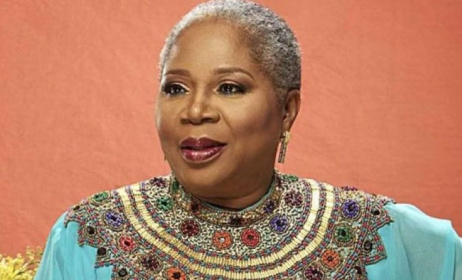Adekunle Gold – Gold
Album: Gold
Label, Year: YBNL Nation, 2016
 Adekunle Gold. Source: 36ng.com.ng
Adekunle Gold. Source: 36ng.com.ng
Adekunle Gold’s music is the alternative version of a genre that hasn’t been mainstream in two decades.
His voice and language are reminiscent of 9ice, the hip hop artist who took Yoruba—not the easily digestible version of the streets of Lagos, but a concentrated version of the language from his roots in Oyo State—and layered it onto danceable beats of Nigerian hip hop. 9ice’s Yoruba is denser than Adekunle Gold's, yet on his eponymous album, Gold, he manages to sound like his music is from an older time.
‘Sade’, a cover of One Direction’s ‘Story of my Life’, was Adekunle Gold's ticket to the Nigerian music scene. Two years after its release, on Gold, he retains that wide-eyed, near-naïve view of love that is the bread and butter of boy bands. In ‘Fight for You’ he is the knight in shining armour, eager to defend a lady abused by her lover. In ‘Nurse Alabere’, he’s a jilted lover asking for a nurse to come treat him because he’s sick because of love. Not for a moment does he even allude to the eroticism usually attached to nurses in popular culture; all he wants is her injection to cure a mania induced by lovesickness.
He takes phrases that are supposed to be tongue in cheek and makes them sentimental. In ‘Paradise’, “Ibi ni ma kusi,” a sentence that originates from the sound Super Mario makes in the first stage as the diminutive plumber approaches home, is used as “This is where I’ll die; I’m not going home,” subverting the joke that all young gamers who spoke Yoruba knew was supposed to taunt you while playing the ubiquitous 8-bit game. You will die here and exit the game. Adekunle, instead, plays no games. He has found love in his woman. He has found paradise. His persona is cloying, teeth-setting sweet, going against the braggadocious origins of his voice.
In 'Orente' he asks the world to praise his lover for sticking with him through thorny times, and in ‘No Forget’ he asks his lover to stay for him as he departs in search of wealth to remedy the rejection received from her mother on account of his poverty. Here he features Simi in a move that begs to be read autobiographically. Simi, after all, used to blog about her mother and Adekunle became popular by photoshopping himself to pictures of stars like Tiwa Savage. Did the impostor meet the mother before becoming a star? They are coy about their relationship so fans are left with speculations.
Born Adekunle Kosoko, Adekunle Gold explains the origins of his moniker on the album's intro: “2008, I wanted a name. I spoke to God, he took me to church. He said son you are golden. There’s nothing better, better than gold.” While the origins of his name are divine, his sound has a more terrestrial source.
He has chosen highlife as base material for his experiments, and then went back in time, and out into the world, adding various styles to that base, his voice working as blending agent. That grainy Yoruba-accented voice of fuji crooners rises above drums and brass of highlife on ‘My Life’, or the strings and piano of soul on ‘Nurse Alabere’. He even adds some South-Asian flavour to it in ‘Ariwo Ko’.
Kola Ogunkoya’s work makes a minor appearance on ‘Friend Zone’, a song where Adekunle Gold sings, “Pemi L’oruko, ko fa mi n’irumu,” borrowing from the former's admonition in ‘Sweetie Baby’ that a reluctant lover call him by name and toy with his moustache and beard. Ogunkoya called his music Afro-Gbedu, performing a combination of Afrobeat and Gbedu, a word which originally described a Yoruba drum but has now become synonymous with good dance music.
Adekunle Gold is the typical Nigerian on his debut album. His desires are simple: he wants to fall in love; he wants to be rich. “Oluwa answer my call, emi naa fera Range o,” he sings on ‘Pick Up’, asking God to grant him the ability to buy a Range Rover, to be wealthy like Dangote and Otedola, billionaire Nigerian entrepreneurs. He desires these things with the cheerful optimism of someone who has found some secret sauce for hope in a country that is wont to drive its inhabitants to cynicism. And it seems Adekunle found at least one of his desires before he was done writing the album.
“Mo n yan fanda niwaju elgan” he sings in ‘My Life’, claiming to strut in front of his detractors like King Sunny Ade does on ‘Merciful God’ (Sunny says "apegan"; Adekunle says "elegan"). He has found wealth, now he starts the process of detangling himself from the ubiquitous enemies. Here, as in ‘Pick Up’, juju takes centre stage: aspirational lyrics backed by the Christian God, a drum-heavy intro, electronic guitar riffs, a dance interlude, and a ready-for-party vibe.
Adekunle Gold’s inventiveness has been rewarded early, a rarity in Nigeria's music scene. But then, danceability always wins. His willingness to use juju and highlife makes him an instrument of nostalgia for a generation oblivious to what they long for. His 16-track album is a confirmation of what many may have suspected since the release of his early singles: that an industry plagued by copycats and bandwagoners has found gold in Adekunle Kosoko.































Comments
Log in or register to post comments